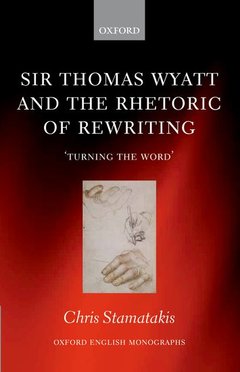Sir Thomas Wyatt and the Rhetoric of Rewriting 'Turning the Word' Oxford English Monographs Series
Langue : Anglais
Auteur : Stamatakis Chris

Chris Stamatakis reappraises Sir Thomas Wyatt (c.1504-1542) as a poetic innovator from the literary avant-garde of early Tudor England. He discusses Wyatt's reflections on the writing process, and his awareness of how words can be turned in new directions - that is, rewritten, amended, transformed, manipulated, even performed - over the course of a text's production, transmission, and reception. Where previous studies have read Wyatt's poetry from a largely biographical standpoint, this book examines the reading practices of his Tudor audiences and editors, and it considers the different types of textuality shown by the manuscript collections that contain his verse. By setting Wyatt's writings in the context of sixteenth-century theories of language and literary practice, and by drawing on early Tudor educational, rhetorical, and courtierly handbooks, Stamatakis examines the rhetoric of rewriting that colours Wyatt's texts. Repeatedly, his writings invite readers to 'turn' or perform the word-to draw out something that lies inert within it. These habits of rewriting and verbal performance often serve to sustain an intimate dialogue between writers and readers in this literary culture. The book pays particular attention to the fascinating materiality of Wyatt's texts: the margins around, and the interlinear spaces within, his poems are regularly filled with new text-handwritten scrawls that are supplied by Wyatt himself or by his copyists, editors and readers. Chapters are devoted to the types of rewriting found in each of Wyatt's main genres: Plutarchian essays; forensic apologias; psalm paraphrases; letters and verse epistles, and lyrics or 'balets'. Two appendices offer further detail about patterns of manuscript transmission and the copying of Wyatt's poems. Sir Thomas Wyatt and the Rhetoric of Rewriting argues that reading often shaded into writing (and rewriting) in the early sixteenth century, and it shows how acts of apparent copying often transformed texts inventively and imaginatively.
Abbreviations. Note on transcription. List of Illustrations. Prologue - What's in a Name?. 1. Torne the worde - Literary Practice in the Early Sixteenth Century. 2. This word redeme - Redemptive Paraphrase in the Penitential Psalms. 3. For your forder aduertisement - Performative Rescription in Wyatt's Letters and Verse Epistles. 4. Pastyme with good companye - Balets and Answer-words. Epilogue - Continuell chaunge. Appendix 1 - Conspectus of Manuscripts. Appendix 2 - Table: Poems common to Egerton and other principal witnesses. Select Bibliography.
Chris Stamatakis studied as an undergraduate and postgraduate at the University of Oxford, writing his doctorate on Sir Thomas Wyatt and early Tudor literary practice. In 2009, he was awarded a Leverhulme Early Career Fellowship and a Junior Research Fellowship at Lincoln College, Oxford, where he contributed to teaching in the Renaissance period and where he worked on a research project examining the influence of Italian literature on the emergence of an English vernacular poetics in the sixteenth century. He is currently a Lecturer in English at University College London.
Date de parution : 03-2012
Ouvrage de 276 p.
14.6x22.1 cm
© 2024 LAVOISIER S.A.S.



